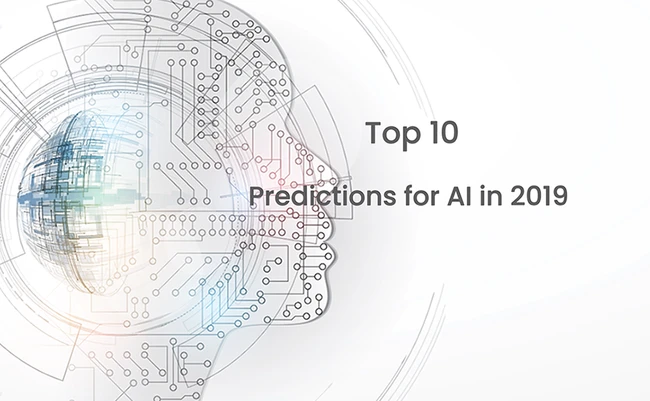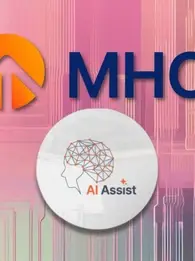
Most IT executives and business leaders are already aware of the incredible power that artificial intelligence (AI) can bring. In fact, AI has the potential to change everything about the way that we interact.
According to PWC, it could contribute up to $15.7 trillion to the global economy in the next 11 years. Perhaps the most exciting thing about AI is that it the technology is continually evolving.
Machine learning (ML) algorithms are becoming smarter, while robots are learning how to process complex human language faster. Here, we'll be looking at some of the most crucial predictions in the current marketplace that determine where AI might be heading next.
Top 10 Predictions for Artificial Intelligence in 2019
Check out The Top 10 Pioneering Women in AI and Machine Learning
Ethics and Governance Grow More Important
Finally, groups, governments, and businesses alike will need to agree on AI governance standards. It will be crucial to implement ethical guidelines for developers to follow when designing new solutions in the future.
In turn, this could reduce the amount of uncertainty in the current marketplace in relation to the nefarious use of AI. The future with AI could be incredible, but only if we use it safely and ethically in order to benefit everyone.
AI Revolutionises the Health Sector
Big data and AI is also becoming more accessible to a range of industries, including health and pharma. ML models will also be able to identify symptoms based on patient records, and thus accurately and quickly diagnose patients.
Additionally, AI can also spur the rise of better pharmaceutical manufacturing, intelligent prosthetics, and more. The AI robot Sophia was initially designed with a vision to help elderly people live their lives independently in the future.
AI and Machine Learning Meets the Edge
Machine learning is a critical subset of AI which allows systems to learn and improve with experience. This technology means that AI can get better over time, influencing the growth of the industry. In 2019 and beyond, AI is likely to meet the edge computing layer, where it can gather information more rapidly, and respond to data collected from IoT beacons and connected devices.
As a result, improved access to information should mean that machine learning models can adapt and improve more quickly. Additionally, edge-based computing combined with connected applications will allow for faster predictions in critical IoT applications for smart cities and disaster prevention. We could even use quick-learning AI to fight back against cybercriminals.
AI will Improve Disaster Management
Over time, AI is becoming increasingly intelligent, responding to everything from human emotion to critical contextual information. In disaster situations, for example, AI-powered robots could take over the roles usually ascribed to humans, including welding and bomb defusing. Smart computers can play an active role in maintaining traffic and preventing crashes or predicting changes in the environment caused by climate change.
Indeed, smart city tests are already trialling smart sensors in order to determine whether AI can accurately predict natural disasters.
AI Assistants Become More Crucial
AI assistants have been a growing part of our day-to-day lives for some time now. The chances are that you don't give a second thought to asking Google or Siri for the time or ordering food through your smart speaker. In the future, many experts believe that virtual assistants will play an even bigger role in the way we interact.
Within the business environment, AI and virtual assistants could make employees more productive, by helping them to manage their schedules, or find crucial information faster. These services will become even more useful as they learn from our behaviour and begin to anticipate our needs.
AI Supports the Job Market
One of the biggest concerns that people have when it comes to AI is that bots will end up stealing human jobs. However, the evidence suggests that AI might make it easier to fill the skills gaps in the world today. Not only can AI help HR experts to find the perfect employee for a role by scanning through countless CVs and applications, but the industry creates new roles too.
According to Gartner, though it is possible that 1.8 million jobs may be lost due to automation - with manufacturing taking one of the biggest hits - over 2.3 million new roles will appear. Gartner believes that new opportunities will be available in the public sector, education, and healthcare.
AI Continues to Predict Buyer Behaviour
As AI becomes increasingly thoughtful, it will better identify the decisions and contextual actions that go into the consumer journey. Currently, companies all around the world are using AI to overcome the inefficiencies in customer service. Predictions suggest that by the end of next year, 85% of customer service interactions will be handled by AI and bots.
The more intuitive AI becomes, the easier it will be to predict future buyer behaviour. It will also improve interactions between businesses and customers. Already, digital brands like Alibaba have begun using chatbots and virtual assistants to handle the majority of their customer/business conversations.
Machines Become More Thoughtful
In the past, many AI discussions focused on the physical actions that machines could manage. Now, however, we're beginning to explore intelligent solutions that are more thoughtful and insightful.
For instance, AI in the customer service environment can pinpoint sentiment in a customer's voice and offer suggestions on how an agent can keep a client happy. In 2019, we'll see growing confidence in the smart and predictive technology that allows AI offer thoughtful tips on how we should work and operate.
AI Grows Increasingly Transparent
As humanity continues to embrace the possibilities of AI and ML, it's important that enterprise AI is transparent. Experts have commented on the potential problem of a "black box" problem, where organisations begin implementing AI systems without a thorough understanding of how they work.
For AI to reach its potential, it thus needs to be trustworthy and transparent. More information about how algorithms and bots work will be crucial to give investors peace of mind.
MLaaS Becomes More Appealing
Countless developers and AI technicians are beginning to explore the convenience offered by as-a-service offerings. In 2018, Amazon, Microsoft, Google, and other major brands introduced bigger and better solutions for pre-build ML strategies. For instance, Google offers the Cloud Machine Learning Engine, while Microsoft has Azure ML Studio.
These tools allow smaller companies to embrace AI, even if they don't have any in-house coding or data analysis expertise. In the future, Machine Learning as a Service (MLaaS) will continue to evolve as a fantastic opportunity for those who want to access disruptive technology on a subscription basis.












